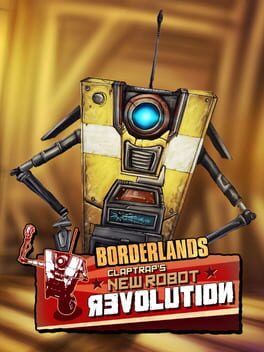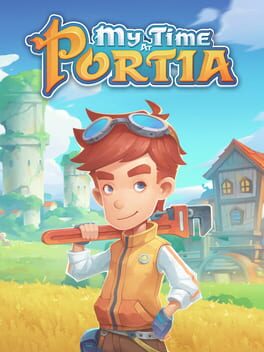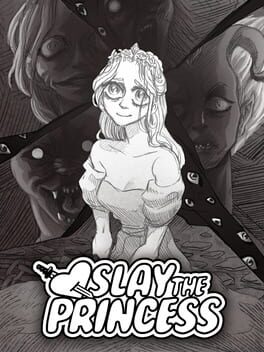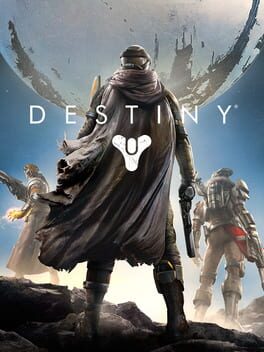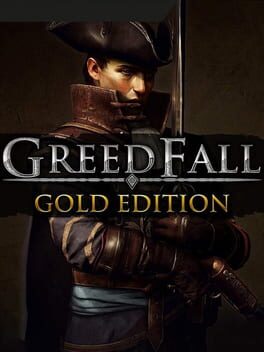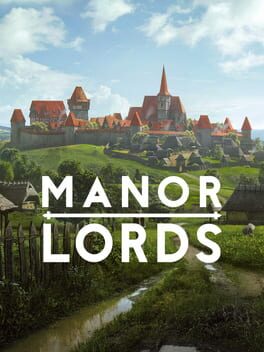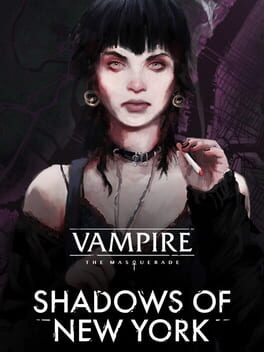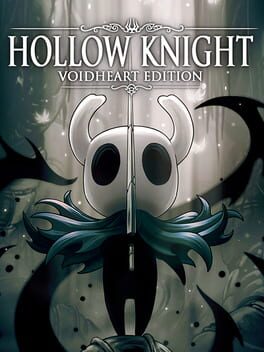328 reviews liked by pidge
My Time at Portia
2019
Started because of Phyllis. She gets me acting up every single time.
It took me 10 hours to realize I actually don't like farming/life sim games. Even though it was such an 'obstacle', I enjoyed it while it lasted. After a while, everything started to feel like a 'burden' rather than an enjoyable experience. Everything feels so tedious and messy that I couldn't even finish building my first bridge during this time.
It took me 10 hours to realize I actually don't like farming/life sim games. Even though it was such an 'obstacle', I enjoyed it while it lasted. After a while, everything started to feel like a 'burden' rather than an enjoyable experience. Everything feels so tedious and messy that I couldn't even finish building my first bridge during this time.
Slay the Princess
2023
Having to make my own decisions was a terrifying experience. I will never do it again. And before anyone asks, I did it, everyone! I fixed her! (I got the good ending)
It was one of the best visual novels I have ever played. Great voice acting, great story, and the voices in my head are accurate. It's impressive that they are still updating the game, and a big update that'll extend the game by 25% is on its way. It's also not a very long game; I finished it in 5 hours because I took my sweet time and wandered around.
There was a sequence where I refused to continue doing what I was told, and the game shut down after the entity told me, "I will be here when you are ready" or something. I was flabbergasted. Next time I opened the game, that same entity welcomed me, and I continued where I left off.
I just wished that the Voice of the Hero and the Narrator's voice wasn't so identical.
It is truly a unique experience and a must-play.
It was one of the best visual novels I have ever played. Great voice acting, great story, and the voices in my head are accurate. It's impressive that they are still updating the game, and a big update that'll extend the game by 25% is on its way. It's also not a very long game; I finished it in 5 hours because I took my sweet time and wandered around.
There was a sequence where I refused to continue doing what I was told, and the game shut down after the entity told me, "I will be here when you are ready" or something. I was flabbergasted. Next time I opened the game, that same entity welcomed me, and I continued where I left off.
I just wished that the Voice of the Hero and the Narrator's voice wasn't so identical.
It is truly a unique experience and a must-play.
Destiny
2014
Developed by the French studio specialized in RPGs: Spiders, Greedfall presents itself as a bold blend of different inspirations gathered into a quite peculiar formula. Elements from Dragon Age, The Witcher, and even Assassin's Creed are present here, generating a "curious" final experience, so to speak.
The game features a creatively designed world inspired by European baroque art, mixing elements from the 17th century with a fantastical universe full of mystical creatures. Here, players are invited to take on the role of De Sardet, an emissary of the Merchant Congregation tasked with exploring an island in search of a cure for a disease plaguing the continent.
The created universe is much richer than it appears at first glance, being by far my favorite aspect of the game. Its story is filled with discoveries and governmental intrigues among factions in constant conflict, where players have total freedom to choose multiple paths to follow as they delve into its vast lore.
About the overall gameplay, it is marked by several pros and cons. Although the game gives you total freedom to interact with all its regions and characters, it can be considered a genuine walking simulator, as what you'll mostly do is walk back and forth, talking to NPCs who will give you missions consisting of talking to a target, running about 300 meters, going to another region, running again, and so on until the quest is completed. Not even with fast travel does this process become minimally enjoyable; it is by far the worst thing the game has to offer. The combat system also stands out as one of the aspects I like the least; I find it clunky and unnatural, whether in fights against humans or monsters, in addition to firearms being completely unbalanced (if you have a lot of ammunition, your character becomes practically invincible). On the other hand, I greatly appreciate its Boss Fights, which go in a different direction by presenting surprisingly fun mechanics.
It took me quite a while to grasp the appeal that the game aims to convey; it only came after about ten hours of gameplay, where I finally began to understand its true proposal. Greedfall is an extensive game that often tests your patience; however, it is worth giving it a chance and immersing yourself in its content. There are several skills to be learned, three different classes to specialize in, several factions to ally with, interesting political plots, and an engaging storyline.
Regarding the DLC (The De Vespe Conspiracy), I consider it entirely forgettable, with nothing being remarkable, reduced to just minimal additional content. It only adds a new area and a type of enemy. The plot is predictable, and I describe it as just a poorly made side quest.
Overall, I would recommend Greedfall to those looking for an RPG with a different theme. Despite my experience being marked by several ups and downs, the game managed to entertain me quite a bit.
The game features a creatively designed world inspired by European baroque art, mixing elements from the 17th century with a fantastical universe full of mystical creatures. Here, players are invited to take on the role of De Sardet, an emissary of the Merchant Congregation tasked with exploring an island in search of a cure for a disease plaguing the continent.
The created universe is much richer than it appears at first glance, being by far my favorite aspect of the game. Its story is filled with discoveries and governmental intrigues among factions in constant conflict, where players have total freedom to choose multiple paths to follow as they delve into its vast lore.
About the overall gameplay, it is marked by several pros and cons. Although the game gives you total freedom to interact with all its regions and characters, it can be considered a genuine walking simulator, as what you'll mostly do is walk back and forth, talking to NPCs who will give you missions consisting of talking to a target, running about 300 meters, going to another region, running again, and so on until the quest is completed. Not even with fast travel does this process become minimally enjoyable; it is by far the worst thing the game has to offer. The combat system also stands out as one of the aspects I like the least; I find it clunky and unnatural, whether in fights against humans or monsters, in addition to firearms being completely unbalanced (if you have a lot of ammunition, your character becomes practically invincible). On the other hand, I greatly appreciate its Boss Fights, which go in a different direction by presenting surprisingly fun mechanics.
It took me quite a while to grasp the appeal that the game aims to convey; it only came after about ten hours of gameplay, where I finally began to understand its true proposal. Greedfall is an extensive game that often tests your patience; however, it is worth giving it a chance and immersing yourself in its content. There are several skills to be learned, three different classes to specialize in, several factions to ally with, interesting political plots, and an engaging storyline.
Regarding the DLC (The De Vespe Conspiracy), I consider it entirely forgettable, with nothing being remarkable, reduced to just minimal additional content. It only adds a new area and a type of enemy. The plot is predictable, and I describe it as just a poorly made side quest.
Overall, I would recommend Greedfall to those looking for an RPG with a different theme. Despite my experience being marked by several ups and downs, the game managed to entertain me quite a bit.
Manor Lords
2024
Persona 3 Reload
2024
As with many players, my introduction to the franchise was through Persona 5. During the pandemic, I played the game, and it quickly became my favorite of all time. It was somewhat amusing because I'm not typically into JRPGs or Japanese culture, but Persona has something truly unique about it. That's why Persona 3 Reload was my most anticipated game of the year, despite being a remake of an older title.
It's nearly impossible to review Persona 3 Reload without comparing it to Persona 5. Since its announcement, Persona 3 Reload seemed like the kind of remake that the Pokémon Company used to do with its older games. And I was right: Persona 3 Reload takes everything developed for Persona 5 and creates a true and good remake.
Persona 3 Reload is a classic Persona game that divides into two parts: your normal life as a student, and a hero's journey to save the world. In the first part, you attend school to study and interact with friends, while in the second part, you face enemies called shadows.
The social aspect of the game is particularly enjoyable. In addition to your duties as a student, you'll need to socialize with various characters from the school and rest of the world. Each character has a unique story, and you'll need to meet them multiple times to complete their storylines. This mechanic is called social links. Compared to Persona 5, I found these stories even more engaging.
The "hero part" is a turn-based RPG. I know that many people don't enjoy games of this style, but Persona games offer dynamic combat. Personally, I'm not usually a fan of turn-based games, but Persona takes the genre to another level.
Despite the game being split into two parts, they converge seamlessly. The interactions you have with friends will make you stronger to face enemies. The game operates on a calendar system, allowing you to decide when to hang out with friends, study, battle against enemies, or improve your social attributes.
The main story of the game starts strong, slows down a bit in the middle, and finishes perfectly. While I still prefer Persona 5's story, it's incredible how Atlus is able to create such incredible characters that are truly charismatic and make you care deeply about them. I enjoyed learning about their lives and backgrounds while also worrying about their futures.
I do think that Persona 3 Reload has some minor issues, such as poorly placed activities in the calendar system. There are moments where you have nothing to do for a few days, followed by days where you're overwhelmed with tasks. This became a problem near the end when I had enough money and maxed out all my social attributes. Additionally, I didn't appreciate how much time it took to start social links with party members, and that it was limited to just the female characters.
Another thing that is truly incredible in this franchise, and it holds true here as well, is the soundtrack. Persona 3 Reload boasts one of the best soundtracks ever in the gaming industry.
It took me 75 hours to finish my first playthrough, and I almost completed everything that could be done.
In conclusion, Persona 3 Reload is one of the best games we've had in recent years, but I still prefer Persona 5. If you enjoy JRPGs or Japanese culture, it's a must-play game. Even if you don't, I recommend giving it a chance, as I promise you won't be disappointed.
It's nearly impossible to review Persona 3 Reload without comparing it to Persona 5. Since its announcement, Persona 3 Reload seemed like the kind of remake that the Pokémon Company used to do with its older games. And I was right: Persona 3 Reload takes everything developed for Persona 5 and creates a true and good remake.
Persona 3 Reload is a classic Persona game that divides into two parts: your normal life as a student, and a hero's journey to save the world. In the first part, you attend school to study and interact with friends, while in the second part, you face enemies called shadows.
The social aspect of the game is particularly enjoyable. In addition to your duties as a student, you'll need to socialize with various characters from the school and rest of the world. Each character has a unique story, and you'll need to meet them multiple times to complete their storylines. This mechanic is called social links. Compared to Persona 5, I found these stories even more engaging.
The "hero part" is a turn-based RPG. I know that many people don't enjoy games of this style, but Persona games offer dynamic combat. Personally, I'm not usually a fan of turn-based games, but Persona takes the genre to another level.
Despite the game being split into two parts, they converge seamlessly. The interactions you have with friends will make you stronger to face enemies. The game operates on a calendar system, allowing you to decide when to hang out with friends, study, battle against enemies, or improve your social attributes.
The main story of the game starts strong, slows down a bit in the middle, and finishes perfectly. While I still prefer Persona 5's story, it's incredible how Atlus is able to create such incredible characters that are truly charismatic and make you care deeply about them. I enjoyed learning about their lives and backgrounds while also worrying about their futures.
I do think that Persona 3 Reload has some minor issues, such as poorly placed activities in the calendar system. There are moments where you have nothing to do for a few days, followed by days where you're overwhelmed with tasks. This became a problem near the end when I had enough money and maxed out all my social attributes. Additionally, I didn't appreciate how much time it took to start social links with party members, and that it was limited to just the female characters.
Another thing that is truly incredible in this franchise, and it holds true here as well, is the soundtrack. Persona 3 Reload boasts one of the best soundtracks ever in the gaming industry.
It took me 75 hours to finish my first playthrough, and I almost completed everything that could be done.
In conclusion, Persona 3 Reload is one of the best games we've had in recent years, but I still prefer Persona 5. If you enjoy JRPGs or Japanese culture, it's a must-play game. Even if you don't, I recommend giving it a chance, as I promise you won't be disappointed.
𝘗𝘳𝘢𝘪𝘴𝘦 𝘵𝘩𝘦 𝘚𝘶𝘯!
A obra responsável por ressignificar todos os conceitos que tornam um jogo "ser difícil", servindo como base de comparação pra qualquer jogo que se propõe a ter um nível de complexidade acima do padrão.
"O Dark Souls dos jogos de luta".
"O Dark Souls dos jogos de plataforma".
"O Dark Souls dos jogos de corrida".
Os exemplos são muitos.
O fato é que Dark Souls é uma das franquias mais importantes e imponentes da história dos videogames, e seu primeiro jogo é considerado por muitos um dos maiores de todos os tempos. Não é de se espantar.
Dark Souls é estupidamente fantástico em tudo que se propõe. A forma com a qual o universo é convincente, vivo e rico é impressionante até para os dias de hoje. Nunca presenciei um level design tão genial e conectado como o de Dark Souls.
Apesar do sofrimento passado principalmente em áreas como a Cidade das Moléstias e a Fortaleza Sen, ou em bosses que nem deveriam ter passado pela equipe de desenvolvimento como o Berço do Caos, nada se compara ao prazer e sentimento de satisfação após cada desafio vencido.
A morte como aprendizado e fortalecimento, é disso que se trata.
São muitas camadas a se explorar quando se trata desse universo, e quanto mais fundo se mergulha no contexto da história de cada lugar ou personagem, cada história que os cenários contam por si só, cada choque de realidade que nos lembra de que estamos nos aventurando por um mundo sem heróis, onde a corrupção é o preço de suas ambições, maior a recompensa. Tudo torna a experiência completamente inesquecível.
Dark Souls é, indiscutivelmente, gigante.
O "vazio", tanto citado durante o jogo, agora se espalha a mim mesmo, visto a certeza de que não jogarei algo equivalente por muito tempo.
A obra responsável por ressignificar todos os conceitos que tornam um jogo "ser difícil", servindo como base de comparação pra qualquer jogo que se propõe a ter um nível de complexidade acima do padrão.
"O Dark Souls dos jogos de luta".
"O Dark Souls dos jogos de plataforma".
"O Dark Souls dos jogos de corrida".
Os exemplos são muitos.
O fato é que Dark Souls é uma das franquias mais importantes e imponentes da história dos videogames, e seu primeiro jogo é considerado por muitos um dos maiores de todos os tempos. Não é de se espantar.
Dark Souls é estupidamente fantástico em tudo que se propõe. A forma com a qual o universo é convincente, vivo e rico é impressionante até para os dias de hoje. Nunca presenciei um level design tão genial e conectado como o de Dark Souls.
Apesar do sofrimento passado principalmente em áreas como a Cidade das Moléstias e a Fortaleza Sen, ou em bosses que nem deveriam ter passado pela equipe de desenvolvimento como o Berço do Caos, nada se compara ao prazer e sentimento de satisfação após cada desafio vencido.
A morte como aprendizado e fortalecimento, é disso que se trata.
São muitas camadas a se explorar quando se trata desse universo, e quanto mais fundo se mergulha no contexto da história de cada lugar ou personagem, cada história que os cenários contam por si só, cada choque de realidade que nos lembra de que estamos nos aventurando por um mundo sem heróis, onde a corrupção é o preço de suas ambições, maior a recompensa. Tudo torna a experiência completamente inesquecível.
Dark Souls é, indiscutivelmente, gigante.
O "vazio", tanto citado durante o jogo, agora se espalha a mim mesmo, visto a certeza de que não jogarei algo equivalente por muito tempo.
Uma sequência direta que cobre muito bem alguns dos principais defeitos de seu antecessor, mas que infelizmente insiste em repetir alguns deles.
Shadows of New York se passa logo após os acontecimentos de Coteries of New York, e se tratando de uma continuação direta da história que foi construída anteriormente, apresenta um seguimento narrativo muito satisfatório.
Estar no controle de uma protagonista muito mais interessante ajuda bastante nesse quesito.
"𝘚𝘰𝘮𝘦𝘵𝘪𝘮𝘦𝘴 𝘐 𝘵𝘩𝘪𝘯𝘬 𝘰𝘧 𝘮𝘺𝘴𝘦𝘭𝘧 𝘢𝘴 𝘢 𝘭𝘦𝘦𝘤𝘩, 𝘧𝘦𝘦𝘥𝘪𝘯𝘨 𝘰𝘯 𝘵𝘩𝘦𝘴𝘦 𝘱𝘦𝘰𝘱𝘭𝘦'𝘴 𝘴𝘵𝘰𝘳𝘪𝘦𝘴, 𝘦𝘮𝘰𝘵𝘪𝘰𝘯𝘴, 𝘢𝘯𝘥 𝘱𝘦𝘳𝘴𝘰𝘯𝘢𝘭𝘪𝘵𝘪𝘦𝘴 𝘫𝘶𝘴𝘵 𝘣𝘦𝘤𝘢𝘶𝘴𝘦 𝘐'𝘮 𝘯𝘰𝘵 𝘴𝘢𝘵𝘪𝘴𝘧𝘪𝘦𝘥 𝘸𝘪𝘵𝘩 𝘮𝘪𝘯𝘦".
Julia Sowinski, uma vampira recém-transformada cuja vida como jornalista investigativa freelancer repleta de dificuldades acabara de ficar para trás.
Inicialmente, vivendo o oposto do que uma glamourosa vida de vampiro parecia ser, nos vemos trabalhando como uma oficial de migração, controlando e supervisionando o fluxo de vampiros dentro e fora de Nova Iorque.
Monótono, assim como parece. Até que a experiência de Julia como jornalista acaba lhe dando a oportunidade de liderar uma investigação de assassinato, cuja resolução definiria seu futuro na sociedade vampírica.
De início, parece ser uma premissa interessante. O problema é: Tudo é imensamente menos emocionante do que a premissa indica.
Há de fato uma investigação, mas em nenhum momento me senti parte dela.
Apesar dos visuais extremamente lindos, Shadows of New York falha em fazer com que o jogador se sinta parte da obra, como se suas escolhas fossem completamente insignificantes pra investigação e não causassem nenhum impacto.
Fico com a sensação de que houve um certo potencial desperdiçado, mas devo dizer que houve uma evolução.
Tanto os diálogos quanto os pensamentos próprios de Julia são muito bem escritos e repletos de uma personalidade forte e complexa que a personagem carrega consigo.
Apesar de não ser a experiência definitiva de Vampire: The Masquerade, suas 5 horas de leituras e mais leituras valeram a pena.
Shadows of New York se passa logo após os acontecimentos de Coteries of New York, e se tratando de uma continuação direta da história que foi construída anteriormente, apresenta um seguimento narrativo muito satisfatório.
Estar no controle de uma protagonista muito mais interessante ajuda bastante nesse quesito.
"𝘚𝘰𝘮𝘦𝘵𝘪𝘮𝘦𝘴 𝘐 𝘵𝘩𝘪𝘯𝘬 𝘰𝘧 𝘮𝘺𝘴𝘦𝘭𝘧 𝘢𝘴 𝘢 𝘭𝘦𝘦𝘤𝘩, 𝘧𝘦𝘦𝘥𝘪𝘯𝘨 𝘰𝘯 𝘵𝘩𝘦𝘴𝘦 𝘱𝘦𝘰𝘱𝘭𝘦'𝘴 𝘴𝘵𝘰𝘳𝘪𝘦𝘴, 𝘦𝘮𝘰𝘵𝘪𝘰𝘯𝘴, 𝘢𝘯𝘥 𝘱𝘦𝘳𝘴𝘰𝘯𝘢𝘭𝘪𝘵𝘪𝘦𝘴 𝘫𝘶𝘴𝘵 𝘣𝘦𝘤𝘢𝘶𝘴𝘦 𝘐'𝘮 𝘯𝘰𝘵 𝘴𝘢𝘵𝘪𝘴𝘧𝘪𝘦𝘥 𝘸𝘪𝘵𝘩 𝘮𝘪𝘯𝘦".
Julia Sowinski, uma vampira recém-transformada cuja vida como jornalista investigativa freelancer repleta de dificuldades acabara de ficar para trás.
Inicialmente, vivendo o oposto do que uma glamourosa vida de vampiro parecia ser, nos vemos trabalhando como uma oficial de migração, controlando e supervisionando o fluxo de vampiros dentro e fora de Nova Iorque.
Monótono, assim como parece. Até que a experiência de Julia como jornalista acaba lhe dando a oportunidade de liderar uma investigação de assassinato, cuja resolução definiria seu futuro na sociedade vampírica.
De início, parece ser uma premissa interessante. O problema é: Tudo é imensamente menos emocionante do que a premissa indica.
Há de fato uma investigação, mas em nenhum momento me senti parte dela.
Apesar dos visuais extremamente lindos, Shadows of New York falha em fazer com que o jogador se sinta parte da obra, como se suas escolhas fossem completamente insignificantes pra investigação e não causassem nenhum impacto.
Fico com a sensação de que houve um certo potencial desperdiçado, mas devo dizer que houve uma evolução.
Tanto os diálogos quanto os pensamentos próprios de Julia são muito bem escritos e repletos de uma personalidade forte e complexa que a personagem carrega consigo.
Apesar de não ser a experiência definitiva de Vampire: The Masquerade, suas 5 horas de leituras e mais leituras valeram a pena.
Enfim, uma das maiores pendências da minha vida se esvai, deixando pra trás um sentimento de arrependimento por nunca ter mergulhado nesse universo antes.
Desde a ascensão do sub-gênero dos "metroidvania", acredito que nada se compara ao nível absoluto de Hollow Knight. Não se trata apenas de uma experiência definitiva, se trata de uma experiência incomparável a qualquer outro similar.
Hollow Knight está no panteão de colossos dentre os maiores e melhores jogos independentes da história.
Muito me fascina o quanto traços de Dark Souls estão presentes por aqui, e não falo da dificuldade, mesmo que seja um ponto muito abordado no jogo.
A forma como cada cenário conta uma história à sua maneira, de um modo sutil e extremamente imersivo, nos ambientando em um universo tomado pela melancolia, fadado a ceder a uma infecção que se alastra cada vez mais, mas que em contraponto nos apresenta pequenas fagulhas de esperança fixadas a personagens únicos e inesquecíveis.
Há muitas memórias que eu gostaria de apagar, apenas para poder reviver todas elas pela primeira vez. Como quando chegamos na Cidade das Lágrimas pela primeira vez, viajamos pelos túneis com o Velho Besouro ou até mesmo quando enfrentamos os Lordes Louva-a-Deus, uma das lutas mais satisfatórias que já experienciei.
Hollow Knight caminha para se tornar um confort game pessoal, e acredito que minha passagem por esse universo ainda esteja distante de um fim.
Desde a ascensão do sub-gênero dos "metroidvania", acredito que nada se compara ao nível absoluto de Hollow Knight. Não se trata apenas de uma experiência definitiva, se trata de uma experiência incomparável a qualquer outro similar.
Hollow Knight está no panteão de colossos dentre os maiores e melhores jogos independentes da história.
Muito me fascina o quanto traços de Dark Souls estão presentes por aqui, e não falo da dificuldade, mesmo que seja um ponto muito abordado no jogo.
A forma como cada cenário conta uma história à sua maneira, de um modo sutil e extremamente imersivo, nos ambientando em um universo tomado pela melancolia, fadado a ceder a uma infecção que se alastra cada vez mais, mas que em contraponto nos apresenta pequenas fagulhas de esperança fixadas a personagens únicos e inesquecíveis.
Há muitas memórias que eu gostaria de apagar, apenas para poder reviver todas elas pela primeira vez. Como quando chegamos na Cidade das Lágrimas pela primeira vez, viajamos pelos túneis com o Velho Besouro ou até mesmo quando enfrentamos os Lordes Louva-a-Deus, uma das lutas mais satisfatórias que já experienciei.
Hollow Knight caminha para se tornar um confort game pessoal, e acredito que minha passagem por esse universo ainda esteja distante de um fim.
